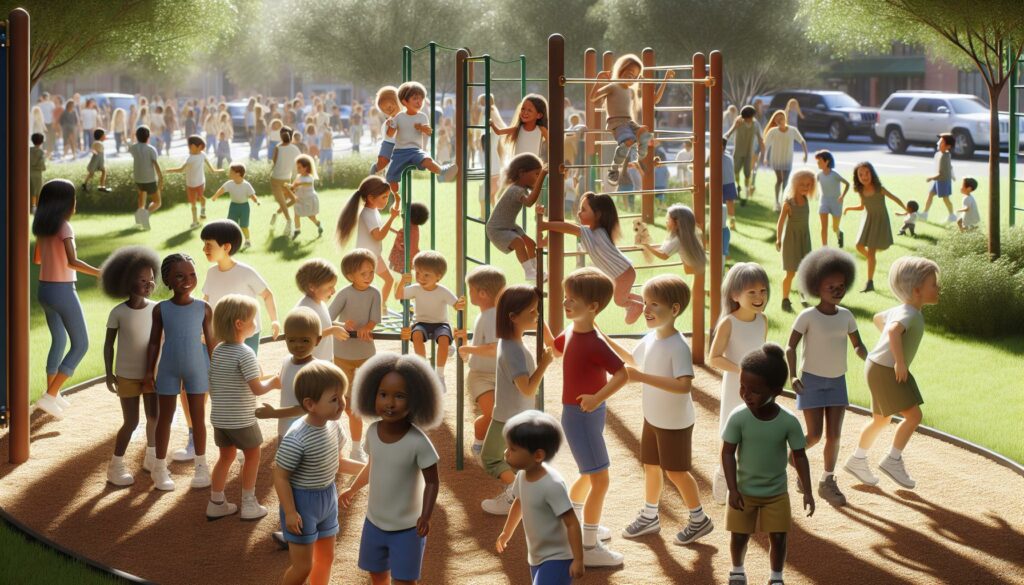Understanding child growth and development is crucial for parents, educators, and anyone involved in nurturing young minds. It’s fascinating to see how children evolve physically, emotionally, and cognitively as they grow. However, not all statements about child development hold true.
In this article, I’ll explore Which of The Following Statements Does Not Apply to The Principles of Child Growth and Development? By distinguishing fact from fiction, we can better support children on their journey to becoming well-rounded individuals. Let’s dive into the principles that truly matter and uncover the myths that can mislead us.
 Key Takeaways
Key Takeaways
- Child Growth is Holistic: Development encompasses physical, emotional, social, and cognitive aspects, all of which interact and influence one another.
- Individual Development Varies: Each child grows at their own pace influenced by genetics and environmental factors, emphasizing the need for tailored approaches to support their learning.
- Misconceptions Abound: Common myths such as uniform development and fixed abilities can hinder support and understanding of a child’s growth journey.
- Importance of Play: Active engagement through play is essential for fostering cognitive and social skills, contrary to the belief that it is merely recreational.
- Gifted Children Also Need Support: It’s a misconception that gifted children can thrive without guidance; they benefit from tailored support to nurture their unique abilities.
Which of The Following Statements Does Not Apply to The Principles of Child Growth and Development?
Child growth and development encompass a variety of stages and milestones that occur as children age. These aspects include physical, emotional, social, and cognitive growth. Each child’s development follows a unique trajectory, influenced by genetic and environmental factors.
Physical development involves changes in body size, muscle strength, and coordination. For instance, infants grow rapidly in height and weight, while toddlers refine their motor skills, enabling them to walk and run.
Emotional development pertains to understanding and managing feelings. Children learn to express emotions, develop empathy, and build relationships with others. This development occurs in stages, where toddlers may exhibit attachment behaviors and preschoolers begin to navigate friendship dynamics.
Cognitive development involves the progression of thinking abilities. From infancy, children explore their environment and learn through interaction. As they grow, they develop problem-solving skills and critical thinking, which are essential for academic success.
Social development reflects the way children engage with peers and adults. It includes learning social norms, understanding roles in various relationships, and grasping the concept of cooperation.
Recognizing the distinct areas of growth aids in identifying typical milestones and addressing concerns that may arise. Understanding these principles forms a foundation for supporting children’s journey through each developmental stage.
Key Principles of Child Growth
Understanding the key principles of child growth enhances support for children’s development. These principles encompass various facets of growth that ensure well-rounded development.
Principle of Holistic Development
Holistic development emphasizes that children’s growth encompasses physical, emotional, social, and cognitive dimensions. Each facet interacts and influences the others. For instance, strong physical health can boost confidence, aiding social interactions. Emotional resilience contributes to children’s ability to face challenges, impacting their cognitive processing. By nurturing all aspects simultaneously, caregivers foster a more balanced and healthy development.
 Principle of Individual Differences
Principle of Individual Differences
Individual differences acknowledge that every child develops at their own pace. Factors such as genetics, environment, and unique experiences shape each child’s growth trajectory. Recognizing these differences promotes tailored approaches to learning and support.
For example, one child may excel in verbal skills while another thrives in logical reasoning. Understanding these variations helps in creating an inclusive environment that values diverse strengths and encourages all children to reach their full potential.
Identifying Misconceptions
Understanding misconceptions about child growth is crucial for effective support. I aim to clarify common myths that may mislead parents and caregivers regarding child development principles.
Common Myths About Child Growth
- Development Is Uniform Across All Children
Many believe that all children reach milestones at the same time. In reality, each child develops uniquely based on genetics and environmental factors. - A Child’s Abilities Are Fixed Early On
Some think that early skills or deficits determine future capabilities. This isn’t true; children’s abilities can change significantly throughout their growth. - Playtime Is Not Critical for Learning
Many underestimate the value of play. Active engagement through play fosters cognitive and social skills essential for holistic development. - Gifted Children Don’t Need Support
Some assume gifted children thrive independently. However, they often benefit from tailored guidance to challenge and nurture their potential.
Which of the Following Statements Does Not Apply?
It’s essential to identify inaccuracies regarding child development principles. Statements that suggest development is linear, uniform across children, or solely determined by genetics do not hold true in practice. Each child’s journey involves a dynamic interplay of various influences, making some common assertions misleading. For instance, believing that children learn best in structured environments disregards the vital role of playful exploration. Understanding these nuances allows for better nurturing of children’s growth and development.
Impact of Misunderstandings
Misunderstandings about child growth and development can negatively affect children’s well-being. Misconceptions may lead to unrealistic expectations, causing undue stress for parents and children. When I encounter ideas suggesting uniform development, I recognize that such beliefs can hinder appropriate support. Children thrive when caregivers acknowledge their unique growth trajectories.
Misguided assumptions about fixed abilities can stifle a child’s potential. Skills aren’t permanent; they can evolve through experience and intervention. If I adhere to the notion that a child’s early performance defines their future, I limit opportunities for exploration and growth. Understanding that abilities can shift encourages a growth mindset, benefiting children’s learning journeys.
 Inadequate recognition of play’s role in development poses another challenge. Play fosters cognitive and social skills; dismissing it as mere recreation undermines essential learning. I observe that engaging children in purposeful play enhances their problem-solving skills and creativity. Supporting these experiences fosters holistic development.
Inadequate recognition of play’s role in development poses another challenge. Play fosters cognitive and social skills; dismissing it as mere recreation undermines essential learning. I observe that engaging children in purposeful play enhances their problem-solving skills and creativity. Supporting these experiences fosters holistic development.
Lastly, misconceptions about gifted children can lead to neglect of their needs. The belief that they require less support can result in unmet potential. I advocate for tailored guidance, ensuring these children receive the appropriate resources to nurture their abilities. Clarity in these principles greatly enhances support for children’s diverse developmental paths.
The Principle of Child Growth
Which of The Following Statements Does Not Apply to The Principles of Child Growth and Development? Understanding the principles of child growth and development is essential for anyone involved in a child’s life. It’s clear that misconceptions can lead to misguided expectations and hinder a child’s progress. By acknowledging that each child develops uniquely and that various factors influence their growth, we can better support their journey.
Recognizing the critical role of play and the need for tailored guidance ensures that we nurture every child’s potential. As we continue to learn and adapt our approaches, we can create an environment that fosters healthy development and encourages children to thrive. This understanding empowers us to be the advocates they need as they navigate their formative years.

